- Home
- Patricia McLinn
Body Brace (Caught Dead in Wyoming, Book 10) Page 4
Body Brace (Caught Dead in Wyoming, Book 10) Read online
Page 4
She half rolled her eyes at me, because I was making her job a bit more difficult, though she knew everything would turn out fine. And she gave away that she would enjoy some of the trip to that happy ending with a dry smile.
I needed to hit the ground running. First, I checked if I’d missed anything from KWMT-TV library resources, then the Independence’s far better database of articles for information on Nadine Hulte. She showed up in a flurry of mentions every other year with a spattering in between. All about the camp for kids associated with the reenactment.
Palmer Rennant didn’t show up at all, except for one cutline under a photo of him and his son, Palmer Junior, after a track meet. Which told me Rennant was a man in his late forties, neither handsome nor not. Make it mildly attractive.
When I broadened the search to national news resources, Nadine and Palmer disappeared.
Remembering Aunt Gee’s comment about Rennant selling a company he’d started on his road to financial independence, I checked business resources. On the fourth, there he was. Owner of a company with one of those names that sounds like an insurance company but could be anything from rockets to an under-eye-puffiness cure. He sold it to a company that was part of a third company that was held by a fourth — all with eminently forgettable names. The sale price wasn’t mentioned. And he didn’t show up since then.
The company he’d sold to — before adding those degrees of separation — was in Maryland. I took a shot and called Baltimore news outlets, then governmental agencies. But a buyout of a company more than a decade ago wasn’t on anyone’s radar. Nor did KWMT-TV in Sherman, Wyoming, motivate any feats of memory.
With Maryland splitting the geographic difference, I called reporters Matt Lester in Philadelphia and Wardell Yardley in Washington, D.C. Neither covered business, but they knew people who did.
No big surprise I didn’t reach either. I left messages saying what I was after and hoped they could help, but it was for background, no more. In other words, I wasn’t calling in favors.
Twirling a pencil through my fingers — if I’d been that good with a baton as a little kid my path in life might have been far more glamorous — I debated.
Calling a source with such scant background went against the grain. On the other hand, Palmer Rennant wasn’t the subject of a story, much less an inquiry. At most, he was on the periphery of this story. Plus, the story had very short legs — after the reenactment tomorrow, there’d be minimal interest until two more years rolled around. And at that point who would care this guy kicked them off the long-standing site? They barely cared now, having found a new home.
I called.
After my mostly futile efforts to get background and all that debating, the guy didn’t answer. I left a message, dangling KWMT-TV out there — hoping it carried more oomph in Cottonwood County than in Maryland — and deliberately vague references to a story.
Les Haeburn and Thurston Fine wouldn’t be in the office for a while yet, but it was still time for me to leave.
Specifically, it was time to corner a real, live person I’d called earlier.
Also to get a good brownie.
* * * *
The most popular item sold in the gift shop of the Sherman Western Frontier Life Museum were brownies made and brought in fresh each day by Vicky Upton, who worked behind the counter.
Vicky hated me for a good portion of my first year in Sherman.
The first time I’d eaten one of those brownies, I hadn’t known Vicky made it until halfway through. I’d had an immediate image of Vicky poisoning it. Yeah, not rational. How could she predict I’d come in on any particular day, right?
Or that I’d buy a brownie.
Okay, that she might have been able to predict.
But, with the brownies known for their freshness, she couldn’t hold onto a poisoned one for any extended period of time on the off-chance I’d come in. And making a poisoned one each day to try to catch me would really cut into her profit margin.
So, I’d kept eating her brownies.
Mind you, I wouldn’t take this chance — even as calculated a chance as it was — for broccoli or oatmeal or granola. But they were good brownies.
Still, I increased the odds in my favor by always stopping at the shop first. Just in case she kept a poisoned brownie in reserve, she wouldn’t have time to swap it out while I was otherwise occupied in the museum and then catch me on my way out.
I spotted her through the glass door into the shop at nearly the same time she spotted me.
She didn’t snarl at me.
A few months back we had a moment of near bonding over pursuing someone who’d tried to run down a young woman, but I hadn’t counted on that doing permanent good.
But now, I’d actually go as far as saying we’d advanced to the bottom edge of neutral.
That was good. It made it less likely she’d try to poison me.
We each said hello — not pushing it with any how are yous — and I purchased a brownie. I said, “Thank you.” She said, “You’re welcome.”
It was the kind of détente moment that gets mentioned in This Week in History features.
Buoyed by that progress in reducing the apparent chances of me dying while feeding my chocolate addiction, I went into the main part of the museum and told Sandy, a volunteer at the front desk, that I was here to see Clara Atwood, the curator.
Sandy smiled, which I especially appreciated now that she no longer hoped each time I came in that I was a paying customer.
She called Clara, then hung up and said, “Clara said to go on back to her office. Have a good day.”
Past a door labeled Staff Only, a corridor led alongside cubicles. The curator’s was the last one on the left. It certainly didn’t raise questions about Clara Atwood wasting museum resources on her professional digs.
I stepped into Clara’s space to find it already crowded with one other person there.
Chapter Seven
She introduced me to Nadine Hulte, describing her as the coordinator of Two Rivers Camp and onsite coordinator for the reenactment.
“Nadine came into town to pick up supplies. It’s rare we see her here during the week of the camp. This should save you both time.”
I noticed Clara didn’t bother with the I hope you don’t mind rubric. That was typical of her. She was a take-charge kind of person. In this case, I didn’t mind. Because she was right, this came as an unexpected bonus.
“We’re so glad you’re coming to the camp.” Nadine’s smile seemed genuine, though frazzled at the edges. Who could blame her after four days of corralling a bunch of kids and with two more days to go on these events? “We’ve been trying to get Thurston Fine or someone to come out all week.”
“I told you that was a long shot,” Clara said.
That didn’t appear to cut any ice with Nadine Hulte. Probably in her late thirties, she was short, with her dark hair in a frothy chin length bob — the froth thanks to the wind. Lighter skin around and above her brown eyes made me guess at large sunglasses worn for long days.
She wore utilitarian jeans, t-shirt, and front-zip hoodie, with what looked like intermittent smudges of charcoal dotted down the right side of her front.
“I don’t understand why it would be such a longshot when he did a story on us before—”
Clara winced.
That reaction reminded me she’d once dated Thurston, which she now regretted. Had he been vehement about not doing the story this year because of its association with Clara?
Heartburn at seeing his former love? That sounded far too human for Thurston. Remembered dismay at having his on-air hair mussed by being outdoors? More likely.
Not privy to any of my thoughts, Nadine stuck to her course.
“It’s a great event — two great events — and absolutely worth covering for KWMT-TV.”
She was one of those people so devoted to a story she wanted told that she kept selling it even after we’d agreed to do it.
“It’s such a sh
ame you didn’t come out earlier to see the activities the kids participate in. Not that you won’t get good material today. You’ll see when you come out. We work hard to give the kids the best experience possible, while leaving them the freedom to also discover opportunities to learn on their own. Not too much structure, but plenty of safety. It lets them grow in their own way.”
Before she got too carried away, I hit practical issues. “Safety must be a concern. Kids around campfires, running around? Knowing first aid, for instance.”
Did the charcoal on her clothes suggest campfires to me, which suggested safety issues?
“Oh yes, all our volunteers are trained in first aid, including the older kids who help with the younger ones. We have never had any major mishaps. But we do have all the required equipment on hand.”
“Fortunate and well-prepared,” Clara said. “Nadine has taken many advanced first aid courses. She knows her stuff.”
Nadine smiled at her.
My mind followed unfortunate possibilities — mishaps, injuries, lawsuits. “I suppose you have to have insurance. Not only accidents, but event insurance for the weather around here?”
“Of course. With kids around and being outdoors, plus doing crafts, and cooking. And then the reenactment — the participants and even the spectators. Beyond that, there’s protection in case weather or an emergency or a hundred other things force partial or complete cancelation, and we had to refund tickets when we’d already paid or committed to pay expenses. That could wipe us out. We get special event insurance that bundles coverage for the camp and reenactment, that way we save a little on the premium.”
“Smart.”
“Wherever we can save a penny to spend it on the events instead, that’s a win.”
“Wish we could get it cheaper, but with only two people offering it in the county, it’s hard to comparison shop. The weather’s never shut us down, but that and all the other disasters are in play every time,” Clara said darkly. “Plus, this year we’ve got complications with the camp and reenactment being in a new location. It made a lot more work and a lot more headaches for Nadine, among other things.”
“I heard about the involuntary move,” I said. “That must have been difficult.”
“That’s all past,” Clara said. “The new location’s turned out great. There’s a sort of natural staging area for the camp and the reenactment. More room, too, so we drew in a second group of reenactors who hadn’t participated before.”
The Independence used that angle for an advance story, talking about reenactors from two tribes coming together for the first time.
“The creek still has water,” Clara continued, “while the other one was dry, which made it hard to tell the story about the miners stopping for water. Also, we’re closer to where the fight actually happened. It’s a more inspiring backdrop.”
“Still, Elizabeth should talk to Palmer Rennant for the other side of the story. That’s what journalists do, right? I’m sure if you called him or went out to his place — I understand it’s not that far out of town — he would give you that angle. Both should be repre—”
Clara cut her off. “Rennant? She doesn’t want to talk to him. Talk about old news. We’ve moved to bigger and better. He has nothing to do with the events anymore. Forget him.”
She did not appear enthusiastic about KWMT devoting coverage to the location change. That made sense when she would sell the event with cute kids and a historic reenactment. Those were the money-makers, not dry administrative matters.
I smiled neutrally. “I understand neither place is the original site? Why not use where it really happened?”
“Landfill.” Clara grimaced. “The site was used as a dump when the town started. By the time people became interested in the history, it was hard to backtrack from that.”
“But as Clara said, this new location is great,” Nadine said with determined, but tired, enthusiasm. “I can’t wait for you to see it. And to talk with the kids. Please join us for lunch.”
“My cameraperson and I won’t be out until two today to see the camp, before coming back tomorrow for the reenactment. But that should be plenty of time. The kids are there each day until five, right?”
Her face fell. “Yes, we’re there until five. But we help set up for the reenactment, so there’s little true camp activity this afternoon.”
Kids can be difficult to interview but video gold. “Let me see if we can move the time up.”
“That would be great. If you can make it by noon, we’ll be having our last lunch celebration before the arranging in the afternoon.” She rallied. “But no matter when you come, we’ll have plenty to show you and kids for you to talk to.”
Chapter Eight
Diana, bless her, did all the rearranging, because she had the schedule to keep.
With a backlog of “Helping Out!” episodes, I didn’t worry about fulfilling that obligation unless something good came along. So, I was free to head out to where Two Rivers Camp was held this week and where the reenactment would take place tomorrow.
After a couple phone calls.
First, to Audrey. She told me Les and Thurston left for lunch.
She’d described Les as frantic and Thurston as smug.
After a moment’s consideration, I had her transfer me to Les’ office line. I left a voice mail saying I was on the assignment, working with Diana.
The main reason was that, although I had Les’ cell number, he didn’t know that and this didn’t seem the moment to break it to him.
Also, it couldn’t hurt Les to stay frantic a little longer and it might help Thurston to have a deeper fall from his extended period of smugness.
I drove farther north than Diana’s or Mike’s ranches and somewhat east of town. Following the directions, I left the paved road for well-maintained gravel, seeing a line of buttes extending in a long, easy sweep, somewhat closer to me on my left and farther away on my right. The road curved around next to a creek, then ended in a final curve, putting the face of the closest butte directly in front of my SUV’s windshield.
Pulling in beside a dozen or more vehicles, I brought my focus down from butte.
It took a moment to realize there was more area between me and the butte than I’d thought. It formed a lopsided V, with the steeper of the two rising sides progressing to the sheer uplift of that impressive butte, with more ranged behind it.
The creek formed the point of the V, with the gentler slope on the near side of the creek.
Knots of kids in varied colored t-shirts dotted the slope just across the creek from where I’d parked. Nadine Hulte and four teenagers set up a square of picnic tables in the middle of the groups. And well to the east of the kids’ activity, a series of blue tarps were strung in a semicircle, blocking the view of what was behind them.
Between the kids and the tarps, a simple plank bridge crossed the creek, a few lighter boards attesting to repairs made this season.
I crossed the bridge. Turn left for the kids? Turn right for the tarps?
I chose left, and started toward Nadine.
She waved, but there was more a sense of waving me off than welcoming. I gestured toward the kids beyond where she was and she nodded.
Pretty brave of me, volunteering to wade into the kid zone on my own. Nobody could say I hadn’t picked up new skills since coming to Wyoming.
The sun felt good after an overnight temperature drop. The sun didn’t rebound the temperature, but at least it was brighter.
I listened to one girl telling a group about how the Crow tribe used rabbitbrush for cough syrup, yellow dye, and wove its branches into baskets.
At another group, the name Fort Phil Kearny caught my attention. I’d swear I’d heard that name from Mrs. P.
Amid urgings to “oh, oh, listen to this,” half the group shared with the other half what they’d learned about how soldiers and a few of their families lived there, including an account of tents not securely set up, letting snow come in and settl
e on sleeping faces. But also picnics that included tinned salmon, pineapples, and plum cakes.
I might have lingered there longer, but I recognized a voice from the next group up the slope.
Tamantha Burrell.
I smiled. Tom had kept up the new haircut a group of us got her during a “girl’s” day out weeks ago. Good for him.
In answer to something she’d said, I heard a smaller girl ask, as I neared their circle, “But when did they play?”
“Kids didn’t play much back then. Everybody helped with stuff — getting water and taking care of the animals and cooking and washing clothes. Think how hard it was to get that bucket of water in the stream and get it back up here today and then how much water you’d need every single day.”
Standing behind Tamantha, I saw eyes widen in her audience of kids younger than her.
“So they had a lot of work to do. But they also did smart things. Who tried the butter churn?” Most hands shot up. “Pretty hard work, huh?” Nods agreed with her assessment. “But they were pretty smart then, too, so when they were on a wagon train, the people who had a cow would put the milk in a bucket under the wagon and it would get bounced around all day because what they called roads were mostly ruts. And what do you think happened to that milk?”
A little girl with pigtails mouthed a word.
As if she’d heard it, Tamantha said, “That’s right, Lia, it became butter.”
Amid chatter about how much easier that would be than the churn — without consideration of what else might get included in butter made by the under-the-wagon method — one of the boys pointed at me and said loudly, “Who’s she?”
Tamantha twisted her head around. “Hi, Elizabeth.” Then she turned back to the others. “This is E.M. Danniher from the TV station. I know her so I can call her Elizabeth. You all call her Ms. Danniher.”
That order given, she returned her attention to me.
“Are you here to do a story?”
“Yes. I’m waiting for Diana — Ms. Stendahl,” I added to stay within her rules of deportment. “Looks like you’re a teacher here.”

_preview.jpg) Almost a Bride (Wyoming Wildflowers Book 1)
Almost a Bride (Wyoming Wildflowers Book 1)_preview.jpg) Prelude to a Wedding (The Wedding Series Book 1)
Prelude to a Wedding (The Wedding Series Book 1)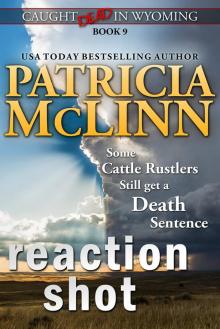 Reaction Shot (Caught Dead in Wyoming, Book 9)
Reaction Shot (Caught Dead in Wyoming, Book 9)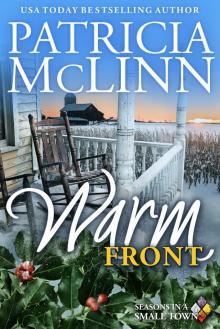 Warm Front
Warm Front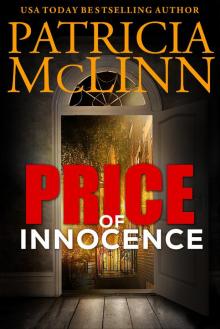 Price of Innocence
Price of Innocence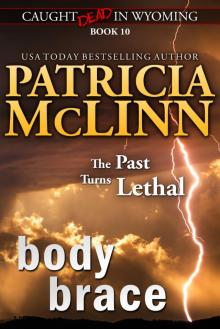 Body Brace (Caught Dead in Wyoming, Book 10)
Body Brace (Caught Dead in Wyoming, Book 10)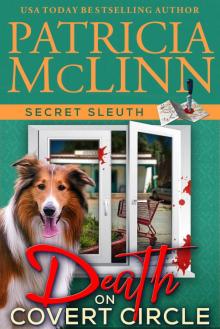 Death on Covert Circle
Death on Covert Circle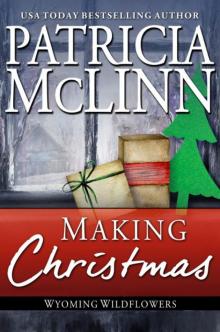 Making Christmas
Making Christmas Death on Torrid Ave.
Death on Torrid Ave.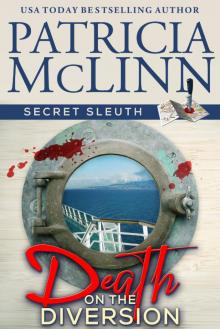 Death on the Diversion
Death on the Diversion The Rancher Meets His Match
The Rancher Meets His Match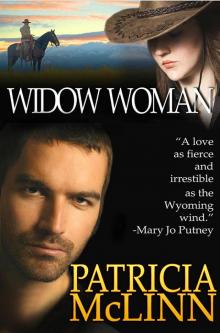 Widow Woman
Widow Woman The Runaway Bride
The Runaway Bride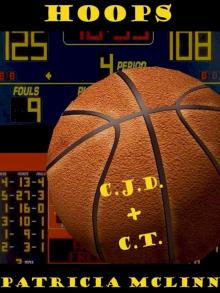 Hoops
Hoops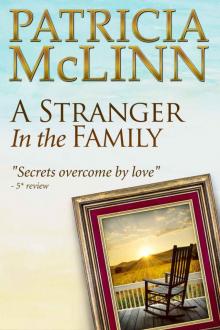 A Stranger in the Family (Book 1, Bardville, Wyoming Trilogy)
A Stranger in the Family (Book 1, Bardville, Wyoming Trilogy)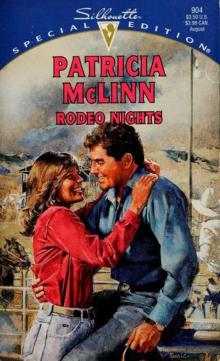 Rodeo Nights
Rodeo Nights Wedding Series Boxed Set (3 Books in 1) (The Wedding Series)
Wedding Series Boxed Set (3 Books in 1) (The Wedding Series)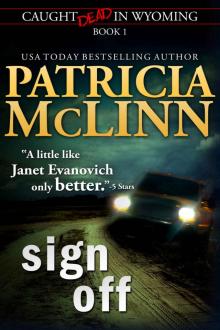 Sign Off (Caught Dead in Wyoming, Book 1)
Sign Off (Caught Dead in Wyoming, Book 1) Prelude to a Wedding
Prelude to a Wedding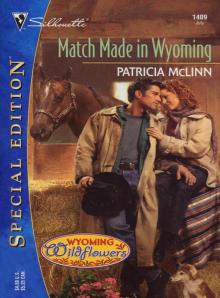 MATCH MADE IN WYOMING
MATCH MADE IN WYOMING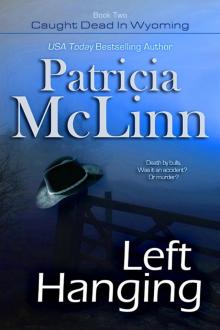 Left Hanging
Left Hanging What Are Friends For?
What Are Friends For?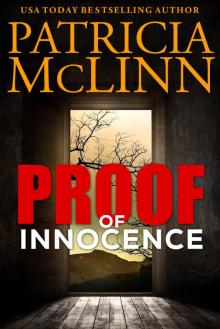 Proof of Innocence
Proof of Innocence Hidden in a Heartbeat (A Place Called Home, Book 3)
Hidden in a Heartbeat (A Place Called Home, Book 3) Baby Blues and Wedding Bells
Baby Blues and Wedding Bells Least Likely Wedding?
Least Likely Wedding? Heart Stealers
Heart Stealers Grady's Wedding
Grady's Wedding Right Brother
Right Brother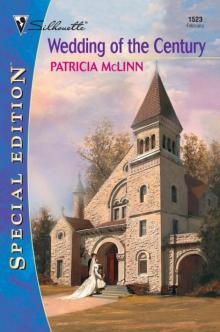 Wedding of the Century
Wedding of the Century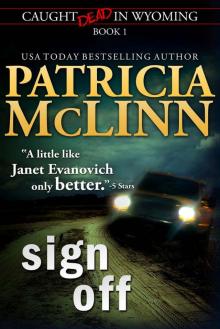 Sign Off
Sign Off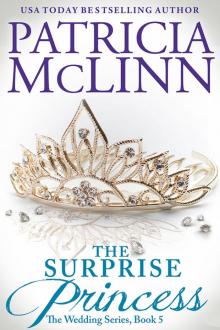 The Surprise Princess
The Surprise Princess Wyoming Wildflowers: The Beginning
Wyoming Wildflowers: The Beginning